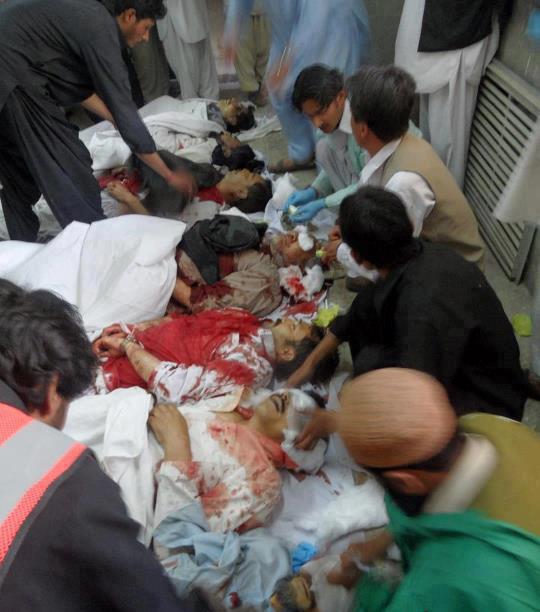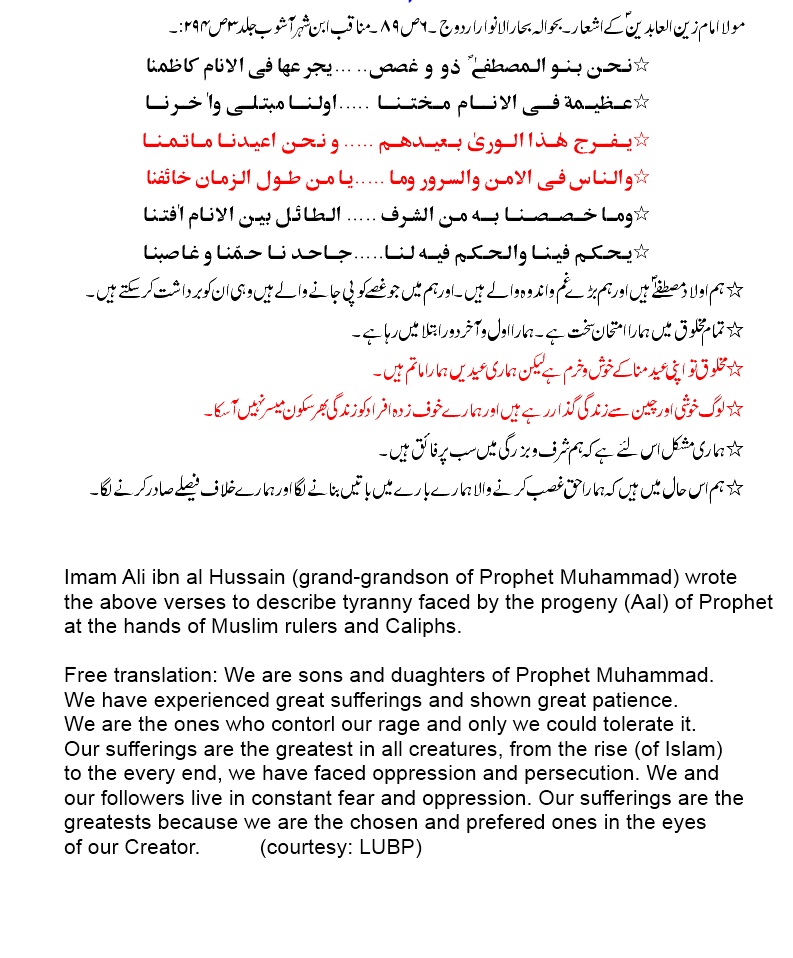List of 9 people responsible for Shia genocide in Pakistan
In the last few decades, more than 20,000 Shia Muslims of diverse ethnic backgrounds have been killed in almost all parts and areas of Pakistan.
In this brief post, I offer my personal assessment of (Pakistani) individuals culpable for Shia genocide in Pakistan.
The list is in order of culpability.
1. Chief of Army Staff General Kayani
2. President of Pakistan Asif Ali Zardari (also in his capacity as co-chairman of PPP)
3. Chief Justice of Pakistan Iftikhar Chaudhry
4. Chief Minister of Punjab Shahbaz Sharif
5. Chief Minister of Balochistan Aslam Raisani
6. ISI chief Lt-Gen Zaheerul Islam
7. Interior Minister Rehman Malik
8. IG Frontier Corps Major General Obaid ullah Khattak
9. Chief of Jang Media Group: Mir Shakil-ur-Rahman
I am not including names such as Chief of ASWJ Ahmed Ludhianvi, Chief of LeJ Malik Ishaq, Chief of Takfiri Deobandi Ulama Mufti Rafi Usmani, Chief of TTP Hakeemullah Mahsud etc because they are nothing without support by the Pakistani State.
Instead of wasting time on foot-soldiers and irritants, Shias, Sunni Barelvis, Ahmadis, Christians and other persecuted groups of Pakistan must recognize their main enemies and seek to expose their culpability and bring them to justice through all possible legal means.



This list is incomplete without mentioning those groups who always encouraged taliban , oppose any military opertation against their hide outs and advocates negotiations with these criminals and declare that this is not ours WAR , it is American WAR. These are the people & groups who eys are closed due to their political interests and they want the nation also to close their eyes. Typical examples are PTI , PML-N , JI , JUI etc.
Kayani and other generals are complicit.
Zardari and Rehman Malik are mere spectators; they won’t give a damn as long as Army doesn’t snatch their cake.
I endorse Tariq Shafi
Democratic Govt has no powers at all
Although in Balochistan , Raisani IS responsible and must be removed
Only Talban And Wahbi
مظاہرین کا کہنا تھا کہ وہ اس وقت تک اپنے رشتہ داروں کی لاشیں نہیں اٹھائیں گے جب تک کوئی اعلی حکومتی عہدیدار ہپستال آ کرانہیں ملزمان کی گرفتاری کے لیے یقین دہانی نہیں کراتا۔
انہوں نے حکومت سے ٹارگٹ کلنگ میں ملوث ملزمان کی گرفتاری کا مطالبہ کیا۔
ہزارہ قبیلے سے تعلق رکھنے والے پاکستان پیپلز پارٹی کے کوئٹہ سے رکن قومی اسمبلی سید ناصر علی شاہ نے بی بی سی اردو کے پروگرام سیربین میں بات کرتے ہوئے کہا ہے کہ ’وہاں (کوئٹہ) میں ریاستی مشینری بالکل ناکام ہوچکی ہے، حکومت نام کی کوئی چیز نہیں ہے وہاں پر، انتظامیہ کچھ نہیں کر رہی ہے، یہاں تک کہ جو فورسز ہیں وہ بھی کچھ نہیں کر رہیں۔۔۔ یہ سب کچھ انہی کے سامنے ہو رہا ہے اور روز ہو رہا ہے‘۔
اس سوال پر کہ وفاق اور صوبے میں ان کی جماعت کی حکومت ہونے کے باوجود یہ مسئلہ کیوں حل نہیں ہو سکا، ناصر علی شاہ نے کہا کہ ’میں تو ساڑھے چار سال سے اسمبلی کے اندر اور اسمبلی کے باہر بلوچستان اور کوئٹہ کے مسئلے پر چیختا رہا ہوں مگر کوئی سنوائی نہیں ہو رہی ہے۔ یہ حکومت اپنے منشور سے ہٹ گئی ہے اور یہ صرف اپنی حکومت کو بچانے میں لگے ہوئے ہیں۔‘
ہزارہ برادری بے بس ہو کر ریاست کی طرف دیکھ رہی ہے: سید ناصر علی شاہ
ان کا مزید کہنا تھا کہ یہ حکومت پورے پاکستان کی عوام سے غافل ہے اور ہزارہ برادری نے سینتیس سال پاکستان پیپلز پارٹی کو ووٹ دیے ہیں مگر کسی نے ہمارے ساتھ ان واقعات کے بارے میں افسوس تک نہیں کیا۔
خیال رہے کہ جمعرات کے روز کوئٹہ کے جی او آر کالونی میں نامعلوم مسلع افراد نے ایڈیشنل سیشن جج ذوالفقار نقوی کو ان کے ڈرائیور اور محافظ سمیت ہلاک کیا تھا۔ ذوالفقار نقوی کی ہلاکت کےخلاف سنیچر کو دوسرے روز بھی کوئٹہ اور صوبے کے دیگرشہروں میں وکلاء نے عدالتوں کا بائیکاٹ کیا ہے۔
گذشتہ ایک ہفتے کے دوران کوئٹہ میں تیرہ افراد کو ٹارگٹ کلنگ کا نشانہ بنایاگیا ہے جن میں سے گیارہ کا تعلق شیعہ مسلک سے ہے۔
http://www.bbc.co.uk/urdu/pakistan/2012/09/120901_quetta_firing_hazara_tk.shtml
Chief minister of sindh , KPK , Gilgit Baltistan ??
and 2ndly in all your reactive shouts Lej-ASWJ there is no third party . . now you making the list of 9 peoples ??
Iran’s influence also absent 😛 having fear ???
میں ایک ایسی جمہوری ریاست میں پل رہا ہوں جہاں کا چیف جسٹس مجھے انصاف نہیں دیتا اور جس نے انصاف بانٹا اُسے موت کی گہری نیند سُلادیا جاتا ہے، جہاں شناختی کارڈ دیکھ کر راشن یا امداد نہیں موت بانٹی جاتی ہے، جہاں مظلوموں کے گلے کاٹے جاتے ہیں، جہاں ظلم کے خلاف اُٹھنے والی آواز پر پابندی لگائ جاتی ہے،
یاد رکھو اگر اس سسٹم کو بدلنا ہے تو بیداری کو اپنانا ہوگا…
کیونکہ بیداری ضروری ہے…..!!
http://www.facebook.com/shiakilling3/posts/425550034148307
میں اپنے ماں باپ کی محبت ہوں، میں نے 12 سال اسکول میں تعلیم حاصل کی اور 2 سال کالج میں، پھر 4 سال یونیورسٹی میں اعلی تعلم حاصل کی، 3 سال بعد میں ایک روزگار سے منسلک ہوگیا۔ اُس کے بعد 2 منٹ تک مجھ پر فرقے کی بنیاد پر گولی برسائی گئی اور 45 منٹ میں مجھے اسپتال منتقل کردیا گیا جہاں پہچ کر مجھے معلوم ہوا کہ میں مرگیا ہوں،
میں ہوں “پاکستان کا مظلوم شیعہ” جو اپنے ہی ملک میں لاوارث ہے۔
I am love of my Mother and Father, I got 12 years of education in School and 2 years in College, than 4 years of Higher Education in University, worked in industry for 3 years. After that, one day, on the basis of my faith/sect, I was shot for 2 minutes and in the next 45 minutes I was shifted to a hospital, where I died.
I am an oppressed Shia Muslim of Pakistan who is unowned in his own country.
http://www.facebook.com/shiakilling3/posts/425693684133942
No end in sight
Tuesday, September 04, 2012
This weekend, five Hazaras returning home after purchasing vegetables and fruits from the Hazar Ganji market, were told by four armed men to disembark from the bus they were on and summarily murdered. Two ‘assailants’ subsequently also shot dead another two members of the Hazara Shia community at the Taftan bus stand minutes after the first shooting. All six killers escaped and chances are that we will never see them again; that they won’t be arrested, tried or prosecuted for these murders committed in cold blood. Indeed, the unaccounted for sectarian killings of people from minority communities has become the norm in Balochistan where this was the third incident of sectarian killings just in the last week, with almost 100 people belonging to Quetta’s Hazara community killed in targeted attacks in this year alone. The pattern of heavily armed assailants stopping buses carrying Hazara passengers has become routine fare; the targets are identified as Hazaras through their physical features and by checking their identity cards for Shia-sounding names; targets are then pulled off the bus and slaughtered one by one. Most appallingly, many such attacks have taken place within half a kilometre of security check posts. Some unconfirmed reports allege over 800 Hazaras have been killed in 30 incidents of mass-murder and 131 targeted ambushes since 2001.
An environment of mourning and insecurity prevailed in the province through this weekend and well into Monday with protests and a shutter-down strike held through Balochistan. But no amount of deaths, or protests, it seems, lead to any tangible action that could put an end to the cycle of violence in the forlorn province. The Supreme Court too has held hearing after hearing and issued orders but no one seems to be listening. The provincial government and its representatives like to spend most of their time in the capital city and the massacre of innocent civilians seems too inconvenient and irrelevant a reality for them to even acknowledge. Responsibility for most sectarian attacks has been claimed by the Lashkar-i-Jhangvi, and recently by the Tehrik-i-Taliban Pakistan. In their edicts handed out across Balochistan, LJ has declared the community ‘wajib-ul-qatl’ (worthy of death) and warned of turning settlements in Hazara Town and on Alamdar Road into graveyards. In an open threat letter distributed at Hazara localities in Quetta, Lashkar-i-Jhangvi warned the community to leave Pakistan by 2012. This year, thus, attacks against Hazaras have picked up as sectarian outfits and their partners have intensified their campaign of hate and death to persuade the Hazaras to leave their homes. Already, fear has led many among them to abandon their workspaces, schools and colleges. In the face of all this, security forces have clearly failed to protect these vulnerable communities – or rather, have not made any meaningful efforts to even try to protect them. Hazaras are being targeted, it seems, for being Shia, anti-Taliban, unsupportive of the state’s policy of strategic depth in Afghanistan and unwilling to fight against the Baloch. There is also much propaganda about them being pro-Northern Alliance, making their loyalty to Pakistan suspect, as well as wild conspiracy theories about them receiving funding from Iran to incite a Shia revolution in Pakistan. The Hazaras respond to these allegations by asking how a small community surrounded by military cantonments can bring about a Shia revolution in Pakistan, and why they should fight their Baloch brothers. But all this hokum aside, the crux of the matter is that nothing will change in Balochistan unless there is a change in the mindset of both the security agencies and the political government. More than anything else, it is the apathy and indifference of these two groups that have seen vulnerable groups become such easy targets of the death drives of groups like the LJ. The groups behind the various kinds of violence in Balochistan need to be brought to justice. But for this to happen, the political government and the security agencies both need to be on the side of the province’s people – not entrapped by the raptures of their own parochial interests and callous agendas.
http://www.thenews.com.pk/Todays-News-8-129935-No-end-in-sight
Shareek e jurm na hotay tu mukhbari kartay
hamayn khabar hai dushman k har thikanay ki